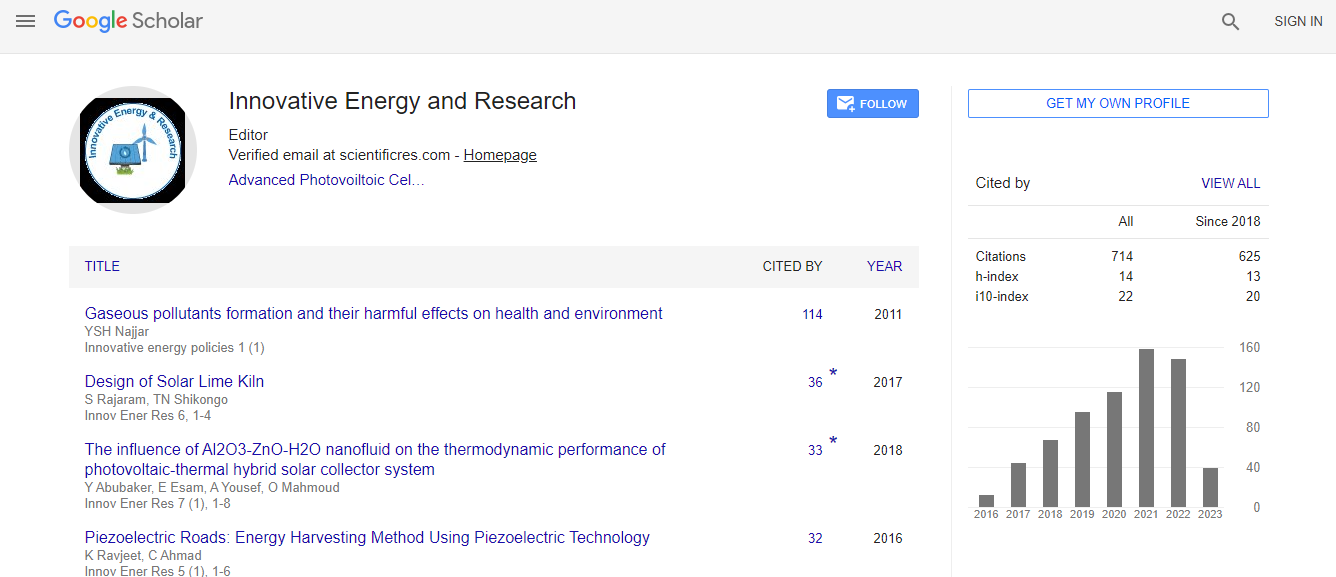Our Group organises 3000+ Global Conferenceseries Events every year across USA, Europe & Asia with support from 1000 more scientific Societies and Publishes 700+ Open Access Journals which contains over 50000 eminent personalities, reputed scientists as editorial board members.
Open Access Journals gaining more Readers and Citations
700 Journals and 15,000,000 Readers Each Journal is getting 25,000+ Readers
Google Scholar citation report
Citations : 712
Innovative Energy & Research received 712 citations as per Google Scholar report
Innovative Energy & Research peer review process verified at publons
Indexed In
- Google Scholar
- Open J Gate
- Genamics JournalSeek
- RefSeek
- Hamdard University
- EBSCO A-Z
- Publons
- Euro Pub
- ICMJE
Useful Links
Recommended Journals
Related Subjects
Share This Page
Pt nanoparticles onto carbon base substrates as anodic materials for direct alcohol fuel cells
Joint Event on 2nd International Conference on Renewable Energy and Resources & Energy Materials and Fuel Cell Research
Beatriz Ruiz Camacho
Guanajuato University, Mexico
ScientificTracks Abstracts: Innov Ener Res
Abstract
The search for new catalytic materials for direct alcohol fuel cells is the aim of this work. One of the main challenges presented by fuel cells is to have adequate catalytic material dispersed on a substrate to enhance its catalytic activity. We have synthesized by the ultrasound technique nanostructured electrocatalysts of Pt supported different carbon base substrates as i) carbon nanotubes (NTC) and ii) zeolite-carbon composite and compared with iii) Vulcan carbon with the goal of studying the effect of the properties of the substrate on the electrical conductivity for the methanol oxidation reaction (MOR) in acid media. Particle size and metal dispersion were evaluated by transmission electron microscopy (TEM) and X-ray diffractometer (XRD) technique was used to investigate the crystalline structure. Cyclic voltammetry (CV) and chronoamperometry (CA) were performed towards the methanol oxidation reaction (MOR) in acid medium. Preliminary results show the properties of substrates as porosity, surface area and the chemical surface of substrate modified the dispersion of Pt nanoparticles as well as the interaction of metal-support which is a parameter responsible for the electrocatalytic activity. Materials synthesized catalyze the MOR, however, different onset potentials and intensity of the forward and backward oxidation peaks were obtained. The presence of zeolite on the substrate plays an important role in the oxidation of methanol. When using carbon nanotubes as a substrate, the Pt/NTC shows low stability and low intensity of the oxidation peaks. As a conclusion, the ultrasonic method allows to obtained Pt nanoparticles less of 10 nm supported on different substrates, the electrochemical activity of the materials synthesized follows the tendency Pt/zeolite-C> Pt/carbon > Pt/NTC.Biography
Beatriz Ruiz Camacho has completed her PhD at the age of 30 years from National Polytechnic Institute. She also obtained an MSc in Science and Materials Engineering from Autonomous Metropolitan University. Actually, She is a Chemical Engineering professor at the Guanajuato University. She has published as the first author in more than 15 papers in reputed journals and she is Vice-president of the Mexican Hydrogen Society. She is author and coauthor of chapters book related with materials for fuel cells. She is expertise in nanomaterials synthesis and characterization, fuel cells, electrocatalysts and renewable energy. She has given lectures at various national and international conferences.
E-mail: beatrizruizcamacho@gmail.com

 Spanish
Spanish  Chinese
Chinese  Russian
Russian  German
German  French
French  Japanese
Japanese  Portuguese
Portuguese  Hindi
Hindi 
